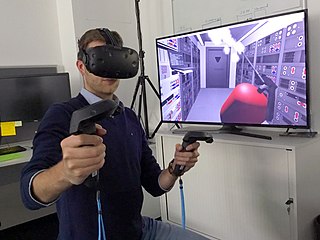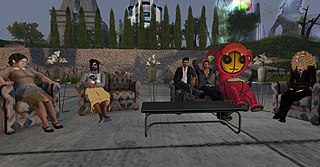
Virtual reality (VR) is a simulated experience that employs 3D near-eye displays and pose tracking to give the user an immersive feel of a virtual world. Applications of virtual reality include entertainment, education and business. VR is one of the key technologies in the reality-virtuality continuum. As such, it is different from other digital visualization solutions, such as augmented virtuality and augmented reality.

The metaverse is a loosely defined term referring to virtual worlds in which users represented by avatars interact, usually in 3D and focused on social and economic connection.

In virtual reality (VR), immersion is the perception of being physically present in a non-physical world. The perception is created by surrounding the user of the VR system in images, sound or other stimuli that provide an engrossing total environment.
Improbable Worlds Limited is a multinational technology company founded in 2012 and headquartered in London, England. It makes metaverse infrastructure and applications, as well as simulation software for video games and corporate use. It reported revenues of £78m in fiscal 2022, up 260% over 2021.

Tony Parisi, one of the early pioneers in virtual reality and the metaverse, is an entrepreneur, inventor and developer of 3D computer software. The co-creator of Virtual Reality Modeling Language (VRML), he has written books and papers on the future of technology. He works on WebGL and WebVR and has written two books on the former, and an introductory book on virtual reality programming. He is the chief strategy officer at Lamina1. Parisi is also a musician, composer and producer working on multiple projects.

nDreams is a company that develops and publishes virtual reality video games. Based in Farnborough, Hampshire, UK, it was formed in August 2006 by former SCi and Eidos creative director, Patrick O'Luanaigh.

Sketchfab is a 3D asset website used to publish, share, discover, buy and sell 3D, VR and AR content. It provides a viewer based on the WebGL and WebXR technologies that allows users to display 3D models on the web, to be viewed on any mobile browser, desktop browser or Virtual Reality headset.

Reality Labs, formerly Oculus VR, is a business and research unit of Meta Platforms that produces virtual reality (VR) and augmented reality (AR) hardware and software, including virtual reality headsets such as the Quest, and online platforms such as Horizon Worlds. In June 2022, several artificial intelligence (AI) initiatives that were previously a part of Meta AI were transitioned to Reality Labs. This also includes Meta's fundamental AI Research laboratory FAIR which is now part of the Reality Labs - Research (RLR) division.

Google Cardboard is a discontinued virtual reality (VR) platform developed by Google. Named for its fold-out cardboard viewer into which a smartphone is inserted, the platform was intended as a low-cost system to encourage interest and development in VR applications. Users can either build their own viewer from simple, low-cost components using specifications published by Google, or purchase a pre-manufactured one. To use the platform, users run Cardboard-compatible mobile apps on their phone, place it into the back of the viewer, and view content through the lenses.

Windows Mixed Reality (WMR) is a discontinued platform by Microsoft which provides augmented reality and virtual reality experiences with compatible head-mounted displays.

HTC Vive is a line of virtual and mixed reality headsets produced by HTC Corporation. The brand currently encompasses headsets designed for use with personal computers as well as standalone headsets such as the Vive Focus line, Vive Flow glasses, and the Vive Elite XR mixed reality headset.
OpenXR is an open-source, royalty-free standard for access to virtual reality and augmented reality platforms and devices. It is developed by a working group managed by the Khronos Group consortium. OpenXR was announced by the Khronos Group on February 27, 2017, during GDC 2017. A provisional version of the standard was released on March 18, 2019, to enable developers and implementers to provide feedback on it. On July 29, 2019, OpenXR 1.0 was released to the public by Khronos Group at SIGGRAPH 2019 and on April 15, 2024, OpenXR 1.1 was released by Khronos.

A virtual reality game or VR game is a video game played on virtual reality (VR) hardware. Most VR games are based on player immersion, typically through a head-mounted display unit or headset with stereoscopic displays and one or more controllers.

VRChat is an online virtual world platform created by Graham Gaylor and Jesse Joudrey and operated by VRChat, Inc. The platform allows users to interact with others with user-created 3D avatars and worlds. VRChat is designed primarily for use with virtual reality headsets, being available for Microsoft Windows PCs and as an app for Android-based headsets such as the Meta Quest, Pico 4, and HTC Vive XR Elite. VRChat is also playable without a virtual reality device in a "desktop" mode designed for a mouse and keyboard, gamepad, or mobile app for touchscreen devices.

NeosVR is a free-to-play, massively multiplayer online, virtual reality application created by Frooxius and operated by Solirax. It was released for free on Microsoft Windows via Steam on May 4, 2018, with support for several VR headsets.

Quest 2 is a standalone virtual reality headset developed by Reality Labs, a division of Meta Platforms. It was unveiled on September 16, 2020, and released on October 13, 2020 as the Oculus Quest 2. It was then rebranded as the Meta Quest 2 in 2022, as part of a company-wide phase-out of the Oculus brand following the rebranding of Facebook, Inc. as Meta.

Meta Horizon Worlds is an online virtual reality game with an integrated game creation system developed and published by Meta Platforms. On this multi-player virtual platform, players move and interact with each other in various worlds that host events, games, and social activities. They can also build and publish worlds similar to Rec Room. Horizon Worlds works on Oculus Rift S, Meta Quest 2, Meta Quest Pro and Meta Quest 3 headsets.
Viverse is an open platform for virtual worlds and environments developed by HTC and encompassing multiple devices and applications. Conceived as a metaverse, the platform is intended to create an interconnected series of virtual worlds, and includes elements of augmented reality. The Viverse platform consists of various components, including virtual reality headsets, social applications, and content creation tools.
Meta Horizon OS, previously known informally as Meta Quest Platform or Meta Quest OS, is an Android-based extended reality operating system for the Meta Quest line of devices released by Meta Platforms. Initially developed for the embedded operating system on the Oculus Rift and Oculus Rift S, the platform has been based on the Android operating system since the release of the Oculus Go in 2018. It first supported augmented reality via grayscale camera passthrough upon the release of the Oculus Quest in 2019, and has supported color passthrough since the release of the Meta Quest Pro in 2022.

AntVR is a discontinued line of virtual reality headsets developed by the Chinese startup AntVR Technology. Operating on open-source software, the headsets were intended to be interoperable with many platforms, including consoles, Blu-ray players and smartphones, but in practice the devices were only supported by PCs.















